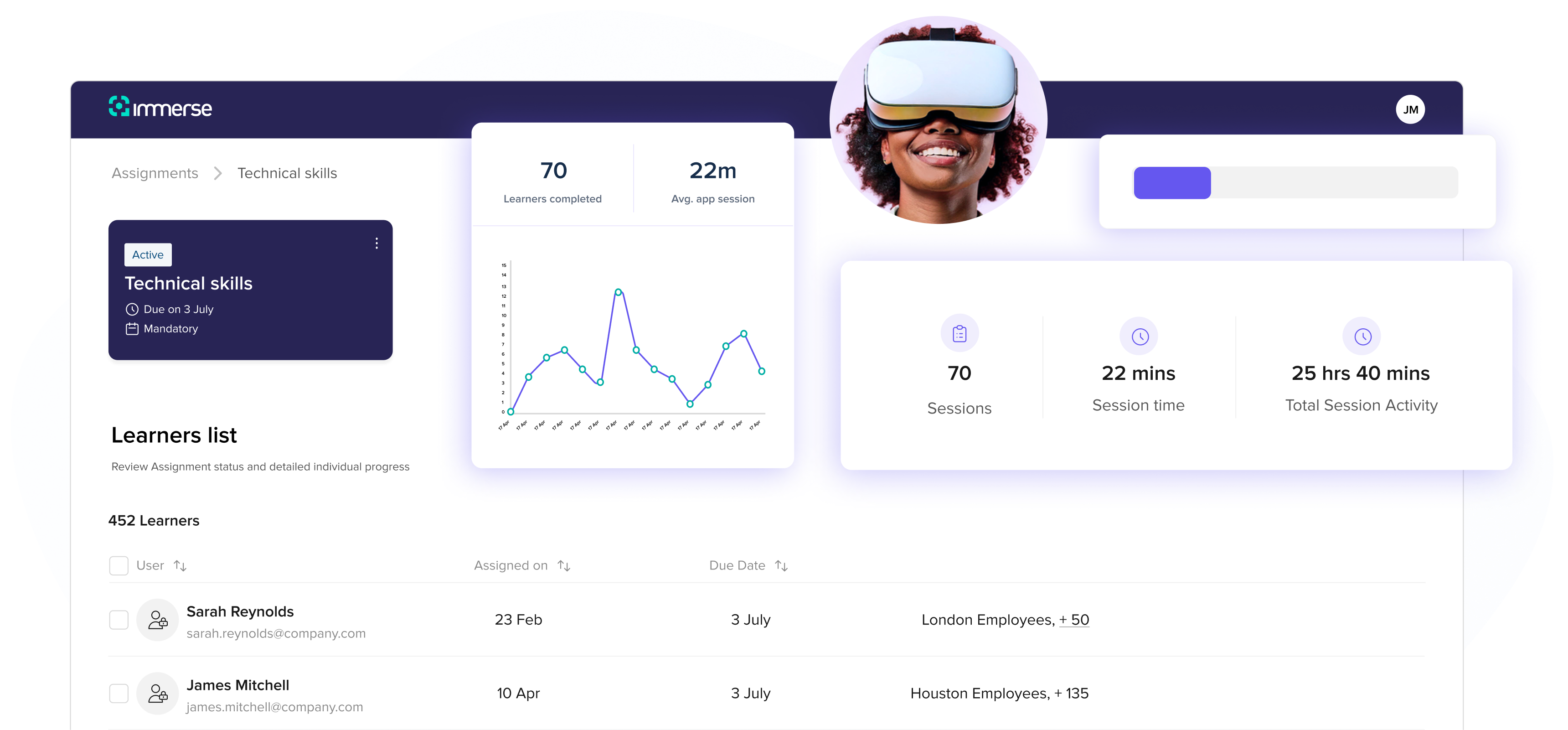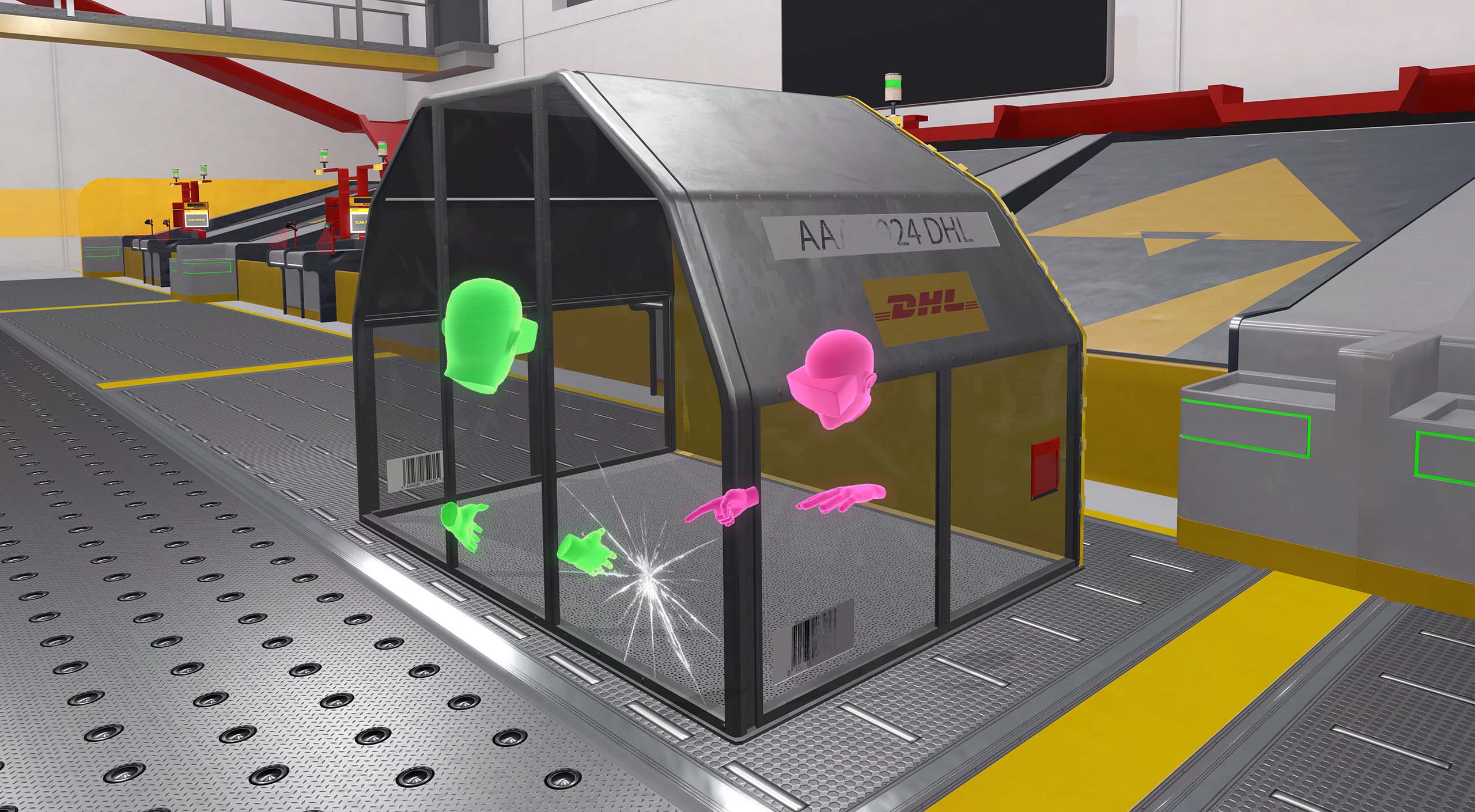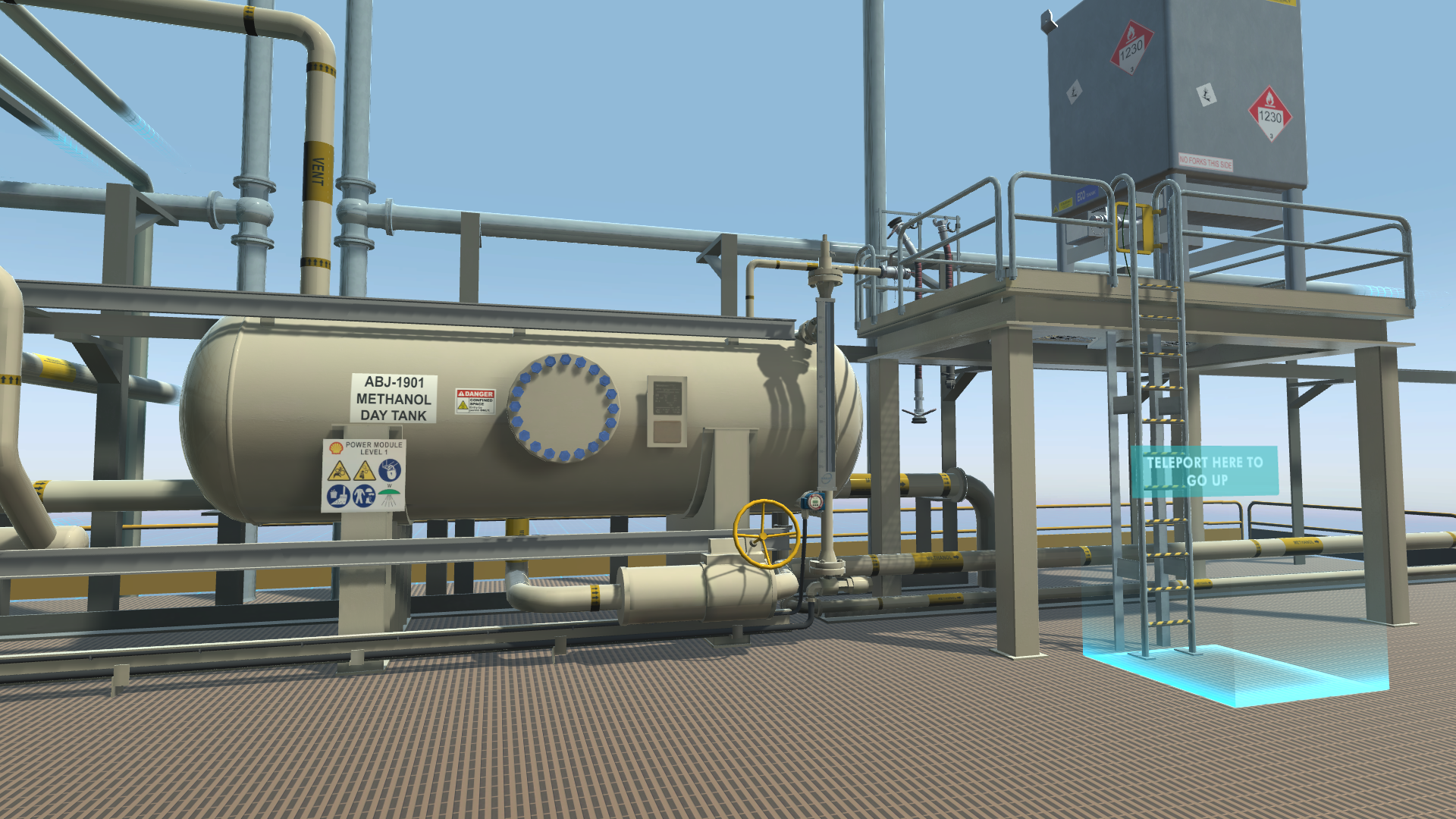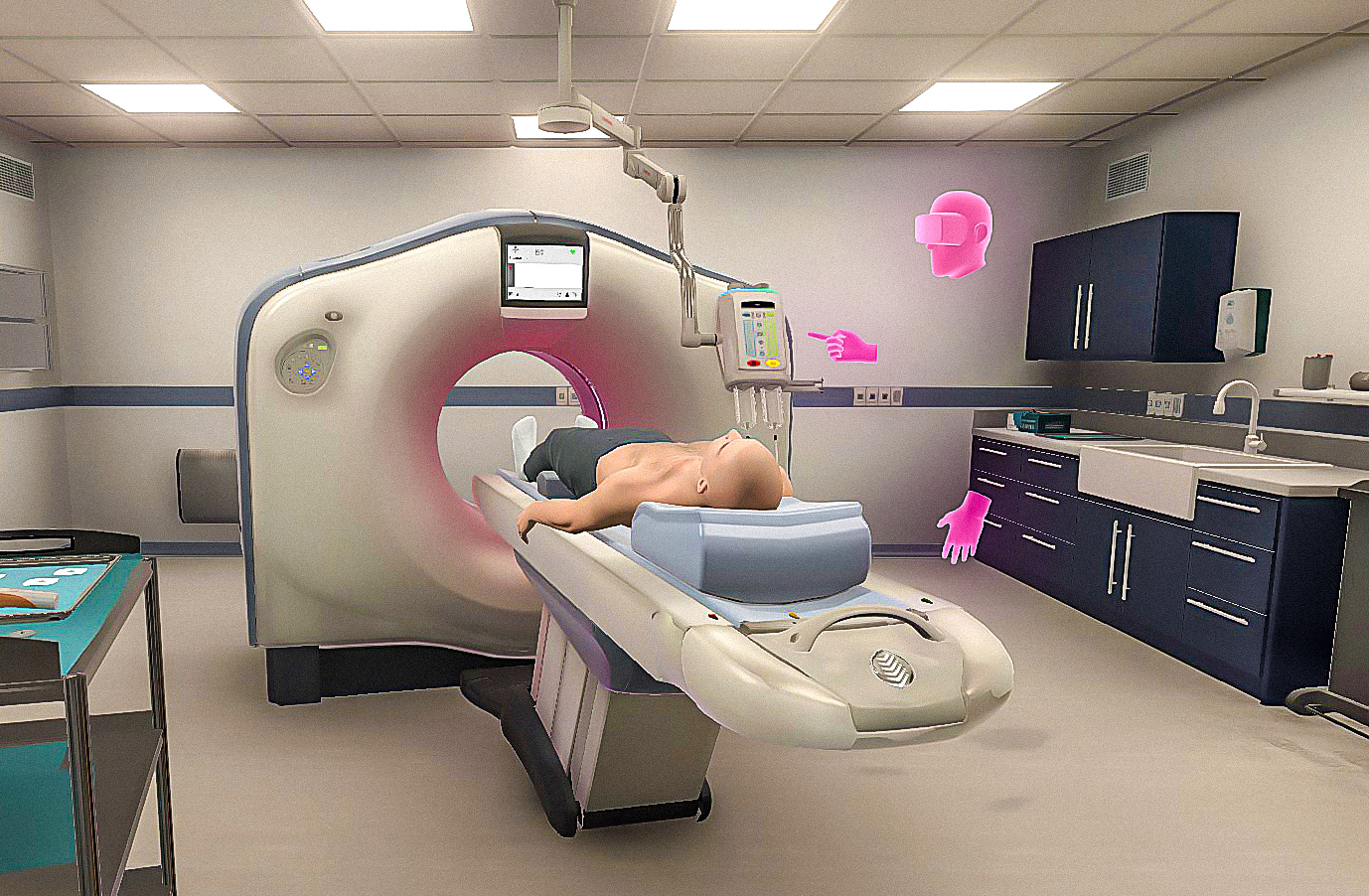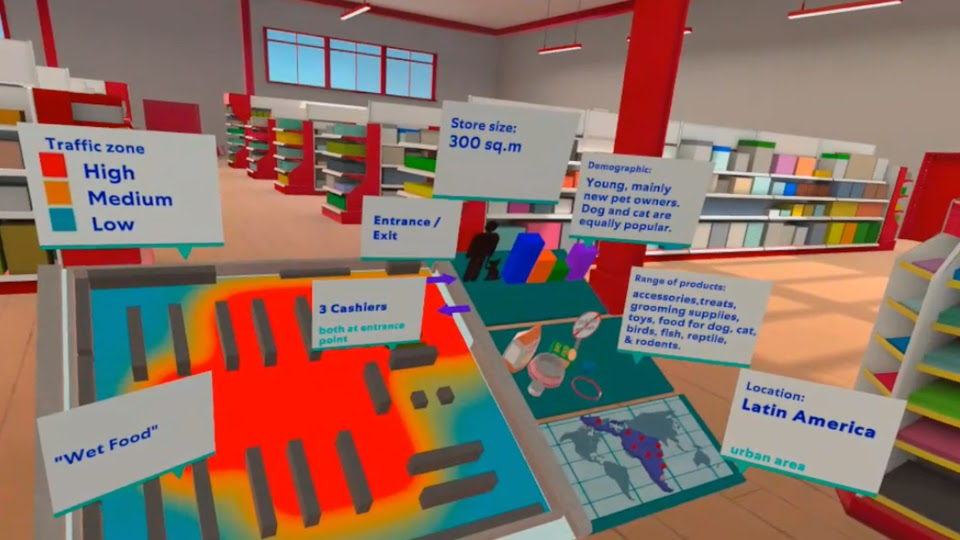
Industries
Contact usVirtual Reality (VR) training is transforming professional development, offering immersive, efficient, and safe training solutions across various sectors. Here’s how VR is reshaping training landscapes in pharmaceuticals, manufacturing, automotive, energy, oil and gas, consumer packaged goods, and logistics.
Pharmaceutical: advancing healthcare with precision training
VR training in the pharmaceutical industry enhances the understanding of complex processes, improves compliance, and accelerates drug development. Complex procedures training enables technicians to practice intricate manufacturing processes in a risk-free environment, significantly reducing the chance of real-world errors. Laboratory safety use cases focus on immersing employees in virtual labs, where they can learn to handle hazardous materials safely, thus minimizing accidents. Quality control inspection simulations help staff to identify and rectify defects, ensuring products meet stringent regulatory standards. Equipment operation allows for hands-on experience with expensive and delicate machinery without the associated risks, leading to improved operational confidence. Clean room compliance teaches the nuances of maintaining sterility, a crucial aspect in drug manufacturing, through interactive experiences. Clinical trials training offers researchers and staff a deeper understanding of protocols and procedures, enhancing trial efficiency. Patient interaction simulations provide pharmacists and sales teams with realistic scenarios to improve communication skills, empathy, and customer service. Emergency response preparedness trains staff for critical incidents, ensuring swift and correct actions in real-life emergencies. Virtual collaborations allow global teams to work together in virtual spaces, speeding up research and development cycles.
Additional use cases include supply chain management for understanding and managing the logistical aspects of pharmaceuticals; patient education programs to better explain treatment options and procedures; and telemedicine training, preparing healthcare professionals for remote patient care.

Manufacturing: enhancing efficiency and safety through immersive learning
In manufacturing, VR training boost operational efficiency, worker safety, and technical skill development. Assembly line operations enable workers to gain proficiency in complex assembly tasks, increasing efficiency and reducing errors. Machinery maintenance and repair simulations allow for practice on virtual versions of expensive machinery, lowering downtime and maintenance costs. Workplace safety training immerses employees in potentially dangerous situations in a controlled environment, enhancing their ability to respond to real-life hazards. Quality assurance procedures help workers to identify and address defects swiftly, ensuring product quality. Lean manufacturing principles are taught through interactive modules, instilling efficiency and waste reduction practices. Robotics and automation integration familiarizes staff with new technologies, smoothing the transition and fostering adaptability. Supply chain logistics simulations offer insights into the complexities of modern supply chains, optimizing decision-making. Product development and prototyping allow for rapid virtual modeling, reducing time and cost. Environmental compliance educates on sustainable practices and regulatory requirements, promoting eco-friendly manufacturing. Cross-training for flexibility prepares employees to perform multiple roles, enhancing operational resilience.
Further use cases encompass inventory management training for optimizing stock levels and reducing waste; ergonomics training to prevent workplace injuries; customer and sales training for interactive product demonstrations; crisis management preparedness to deal with unexpected events; and collaborative engineering, enabling remote teams to work together on product design in virtual spaces.
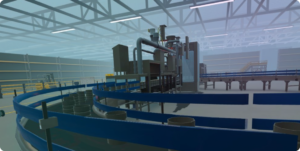
Automotive: driving innovation and safety with VR training
The automotive industry is harnessing VR to enhance design, manufacturing, and customer service processes. Design and prototyping allow for the creation and testing of vehicle models in virtual space, streamlining the development process. Assembly line training provides a hands-on approach to learning complex assembly tasks without the risk of error or injury, improving efficiency and quality. Paint shop operations simulate the painting process, enabling technicians to master color matching and application techniques. Safety procedures and ergonomics ensure workers understand how to safely operate equipment and maintain proper posture, reducing injuries. Quality inspection simulations help identify and address manufacturing defects, guaranteeing high-quality vehicles. Dealer and showroom staff training equip sales teams with comprehensive product knowledge and effective sales strategies, enhancing the customer purchase experience. Customer experience management simulations prepare staff for various service scenarios, improving customer satisfaction. Maintenance and repair sessions offer detailed, hands-on experience with vehicle systems, ensuring service excellence. Environmental and sustainability training highlight the importance of eco-friendly practices in manufacturing and vehicle design. Virtual test drives provide potential customers with immersive driving experiences, boosting marketing efforts and consumer interest.
Additional use cases include supply chain management for efficient parts and vehicle distribution; emergency response training for safety and accident preparedness in manufacturing plants; electrical and hybrid systems training to keep pace with evolving vehicle technologies; and innovation and creativity workshops, fostering collaborative problem-solving in vehicle design and manufacturing.
Energy, Oil, and Gas: ensuring safety and efficiency through VR training
The energy, oil, and gas industry leverages VR to enhance safety training, operational efficiency, and emergency preparedness. Hazard identification and safety procedures immerse employees in realistic scenarios to enhance hazard awareness and safety protocol adherence. Equipment handling and operation provide hands-on experience with industry-specific machinery, minimizing the risk of accidents. Emergency response drills offer realistic practice for incidents like oil spills or gas leaks, ensuring a quick and effective response. High-risk environment familiarization allows workers to experience extreme conditions such as offshore platforms, preparing them for the challenges they will face. Process simulation for complex processes like drilling or refining improves understanding and efficiency. Maintenance and troubleshooting simulations extend equipment lifespan and reduce downtime. Regulatory compliance training ensures that operations meet industry standards and regulations. Environmental awareness programs highlight the impact of operations on ecosystems, promoting sustainable practices. Virtual site visits enable new employees to familiarize themselves with large and complex facilities. Collaborative problem solving in VR fosters teamwork across different locations on technical challenges.
Other notable use cases are remote operations training, preparing staff for controlling machinery from a distance; data interpretation and analysis in virtual models; leadership and management training within virtual environments; and innovation and design thinking workshops, leveraging VR for creative problem-solving.
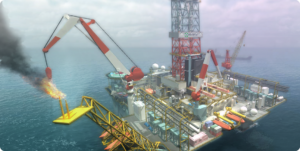
Consumer packaged goods: revolutionizing training for market success
Virtual Reality (VR) training in the Consumer Packaged Goods (CPG) industry is transforming how companies approach product development, marketing, and safety. Retail merchandising and layout simulations assist in designing effective store layouts and displays, enhancing consumer engagement and sales. Consumer behavior analysis through virtual store walkthroughs provides valuable insights into shopping patterns, allowing for targeted marketing strategies. Product packaging and design workshops enable creative exploration in 3D environments, leading to innovative packaging solutions. Supply chain management scenarios improve logistics and distribution strategies, ensuring efficiency and reducing costs. Safety and compliance training ensure employees understand and adhere to industry regulations and standards, maintaining product integrity. Equipment operation and maintenance train staff on production line machinery, reducing downtime and maintenance costs. Quality control procedures enhance product consistency and customer satisfaction, building brand loyalty. Sustainability and environmental training promote green practices within production and packaging, aligning with consumer values. Marketing and sales simulations provide teams with realistic scenarios to test strategies, refining sales techniques. New product development and testing allow for virtual prototyping and consumer feedback collection, accelerating product innovation.
Further applications include inventory management to optimize stock levels; crisis management for handling product recalls or other emergencies effectively; employee onboarding for immersive introductions to company culture and processes; customer service training to simulate real-life consumer interactions; and operational efficiency workshops, leveraging VR to identify and implement process improvements.

Logistics: streamlining operations with immersive VR training
VR training in the logistics industry is revolutionizing how companies manage warehouse operations, transportation, and safety, leading to unprecedented efficiency and accuracy. Warehouse operations simulations immerse employees in the complexities of inventory management and order fulfillment, reducing errors and improving processing times. Forklift operation use cases offer a safe, realistic environment for operators to gain proficiency, minimizing the risk of accidents and product damage. Load and unload procedures ensure that staff are skilled in handling goods efficiently, preventing injuries and damage to cargo. Safety and compliance training in VR environments enhances understanding of workplace hazards and compliance with regulations, fostering a safer working environment. Route planning and management simulations improve logistics efficiency and customer satisfaction by optimizing delivery schedules and routes. Inventory management training uses VR to help staff master stock level optimization, reducing waste and shortages. Cross-docking and distribution strategies are refined through virtual practice, improving throughput and reducing storage needs. Customer service scenarios prepare employees for real-life interactions, enhancing problem resolution skills and customer satisfaction. Equipment maintenance sessions in VR extend the lifespan of critical logistics machinery, reducing repair costs and downtime. Disaster preparedness and response training equips teams to effectively manage supply chain disruptions, maintaining operational continuity even in adverse conditions. vital use cases include sustainability training for adopting greener logistics practices; technology adoption, such as virtual training on RFID and IoT integration; leadership development within operational contexts to foster managerial skills; global logistics management for insights into international shipping regulations and customs; and collaborative planning, where VR facilitates strategy sessions among supply chain partners, improving coordination and efficiency.

By adopting VR training, these industries are not only enhancing operational efficiency and safety but are also fostering innovation, ensuring regulatory compliance, and improving customer experiences. This technology enables businesses to stay competitive in rapidly changing markets, driving future growth and success.
Deliver VR training to learners and track results, easily
Provide immersive experiences in minutes and measure success with simple technology that just works—so you can focus on what matters most.
Explore product